
Sir John Barbirolli was a British conductor and cellist. He is remembered above all as conductor of the Hallé Orchestra in Manchester, which he helped save from dissolution in 1943 and conducted for the rest of his life. Earlier in his career he was Arturo Toscanini's successor as music director of the New York Philharmonic, serving from 1936 to 1943. He was also chief conductor of the Houston Symphony from 1961 to 1967, and was a guest conductor of many other orchestras, including the BBC Symphony Orchestra, London Symphony Orchestra, the Philharmonia, the Berlin Philharmonic and the Vienna Philharmonic, with all of which he made recordings.
Richard Gilford Adeney was a British flautist who played principal flute with the London Philharmonic Orchestra and the English Chamber Orchestra, was a soloist and a founding member of the Melos Ensemble.

Sir Malcolm Henry Arnold was an English composer. His works feature music in many genres, including a cycle of nine symphonies, numerous concertos, concert works, chamber music, choral music and music for brass band and wind band. His style is tonal and rejoices in lively rhythms, brilliant orchestration, and an unabashed tunefulness. He wrote extensively for the theatre, with five ballets specially commissioned by the Royal Ballet, as well as two operas and a musical. He also produced scores for more than a hundred films, among these The Bridge on the River Kwai (1957), for which he won an Oscar.
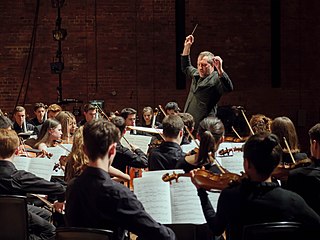
Thomas Joseph Edmund Adès is a British composer, pianist and conductor. Five compositions by Adès received votes in the 2017 Classic Voice poll of the greatest works of art music since 2000: The Tempest (2004), Violin Concerto (2005), Tevot (2007), In Seven Days (2008), and Polaris (2010).
John Andrew Howard Ogdon was an English pianist and composer.
Ralph Vaughan Williams dedicated his Symphony No. 4 in F minor to Arnold Bax.
Four Scottish Dances (Op.59) is an orchestral set of light music pieces composed by Malcolm Arnold in 1957 for the BBC Light Music Festival.
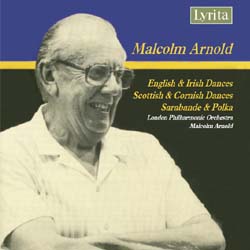
English Dances, Op. 27 and 33, are two sets of light music pieces, composed for orchestra by Malcolm Arnold in 1950 and 1951. Each set consists of four dances inspired by, although not based upon, country folk tunes and dances. Each movement is denoted by the tempo marking, as the individual movements are untitled.
Richard Blackford is an English composer.

The Symphony No. 6, Op. 95 by Malcolm Arnold was written in 1967, and finished in July of that year. It is in three movements:
John Douglas Louis Veale was an English classical composer.

The Symphony No. 2, Op. 40 by Malcolm Arnold is a symphony dating from 1953. Arnold composed the symphony on commission from the Bournemouth Winter Garden's Society. He dedicated the score to the Bournemouth Symphony Orchestra and conductor Charles Groves, who premiered the work on 25 May 1953.
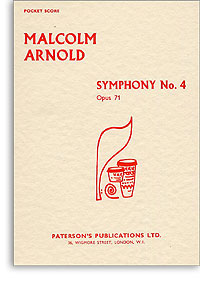
The Symphony No. 4, Op. 71 by Malcolm Arnold was finished on 13 July 1960. It is in four movements:

The Symphony No. 1, Op. 22, is a symphony written by Malcolm Arnold in 1949. Arnold conducted the first performance at the Cheltenham Music Festival in 1951, with The Hallé Orchestra. A miniature score was published in 1952.
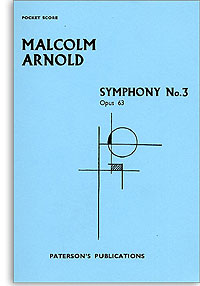
The Symphony No. 3, Op. 63 by Malcolm Arnold was finished in 1957. It is in three movements:
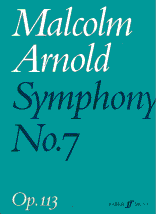
The Symphony No. 7, Op. 113 by Malcolm Arnold was finished in 1973. It is in three movements:

Robert Augustine Irving, DFC*, was a British conductor whose reputation was mainly as a ballet conductor.
The Hoffnung Music Festivals were a series of humorous classical music festivals created by cartoonist and amateur tuba player Gerard Hoffnung and held in the Royal Festival Hall in London. The concerts consisted of humorous works specially commissioned from well-known composers of the day.
Malcolm Lipkin was an English composer.

Kenneth Alwyn Wetherell was a British conductor, composer, and writer. Described by BBC Radio 3 as "one of the great British musical directors", Alwyn was known for his many recordings, including with the London Symphony Orchestra on Decca's first stereophonic recording of Tchaikovsky's 1812 Overture. He was also known for his long association with BBC Radio 2's orchestral live music programme Friday Night is Music Night, appearing for thirty years as a conductor and presenter, and for his contribution to British musical theatre as a prolific musical director in the 1950s and 1960s. He was a Fellow of the Royal Academy of Music and married the actress Mary Law in 1960. His website and the first volume of his memoirs A Baton in the Ballet and Other Places were both published in 2015. The second volume Is Anyone Watching? was published in 2017.











